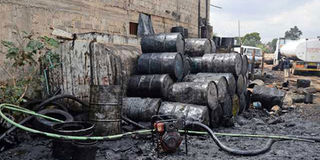Selective raid mars illegal fuel purge

An illegal fuel mixing site in Bahati, Nairobi, that the Energy and Petroleum Regulatory Authority unearthed during a crackdown on October 29, 2018. PHOTO | SALATON NJAU | NATION
What you need to know:
- The unlicensed fuel dealers, whose sites are known as shamba, reportedly have an amorphous organisation complete with a chairman whose role is, among other things, to mobilise bribes for protection of the sites and secure release of members whenever they are arrested.
A fallout is said to have led to the “selective raids”.
Some of these small dealers felt the chairman was demanding too much money to pay the authorities
Tuesday’s ‘crackdown’ on fuel adulteration sites in Nairobi Industrial Area where the Energy and Petroleum Regulatory Authority (EPRA) tagged some journalists along has raised more questions on the handling of the illegal business.
The round trip along various roads in the area where the EPRA had ambushed several suspects said to have been engaging in mixing diesel and kerosene meant for export as well as making heavy industrial oil, left a number of active adulteration dens operating undisturbed, some of whose details the Nation had given before.
While on the trip to show journalists where raids had been conducted (some more than four days before), the convoy stopped at Road-1 where EPRA Director General Pavel Oimeke announced that some 16 suspects had been arrested three days earlier.
The compound with a perimeter wall also had a watchtower next to the gate to spot any suspicious person walking along the road.
The convoy then proceeded to Rangwe Road where elements of the ‘selective raid’ began to emerge.
Just about 200 metres after the Rangwe Road site where two trucks had been detained under the guard of GSU officers, a brown gate on the opposite side concealed an illegal petroleum dealership. It was not touched.
An empty plot separated the guarded site where court sessions were conducted on Thursday and another adulteration site, which the Nation exclusively detailed in 2016.
On Tuesday, when the media visited, a white truck was being washed outside the gate to disguise the site even as curious onlookers stood outside the facility adjacent to the Mukuru slums.
This one too was not visited and our informers intimated that the owners had been warned in advance about the raid.
FALLOUT
The unlicensed fuel dealers, whose sites are known as shamba, reportedly have an amorphous organisation complete with a chairman whose role is, among other things, to mobilise bribes for protection of the sites and secure release of members whenever they are arrested.
A fallout is said to have led to the “selective raids”.
“Some of these small dealers felt the chairman was demanding too much money to pay the authorities and since it is nothing official, they were not sure where the money was being taken so they refused and now you can see from the selective raids that someone is behind it. They will not touch the chairman’s shamba,” said one of the sources with insider knowledge of the operations.
The chairman’s shamba is said to be the one located off Lunga Lunga road just opposite a factory that manufactures plastic tanks and containers.
By Friday, trucks were still seen going in and out of the secured compound.
The EPRA, which kept tweeting about the Tuesday media tour on the sites, did not respond to concerns raised by some social media users that the illegal sites have continued to operate openly.
Mr Oimeke, the EPRA boss, however, dismissed the allegations of selective raids on the illegal sites, calling for anyone with such information to present it.
“I am not aware of that and I am not sure which one you are referring to because we have closed hundreds of sites already. If you know any that we have not raided, just come and give us details. We will even give you a small token as a reward,” he said.





